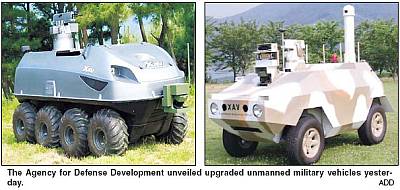The U.S. Department of Defense aims to utilize AI in the military for ``operating autonomous drones,'' ``monitoring threats in outer space,'' and ``maintenance of aircraft and soldiers.''

As systems that utilize AI are being introduced in various fields such as automobiles, translation services, and detection of fraudulent credit card use, the military use of AI is also attracting a lot of attention.
Pentagon's AI initiatives accelerate decisions on lethal autonomous weapons | AP News
https://apnews.com/article/us-military-ai-projects-0773b4937801e7a0573f44b57a9a5942

In August 2023, the U.S. Department of Defense announced an initiative called ``Replicator'' to deploy thousands of relatively inexpensive and consumable AI-enabled autonomous drones by 2026. Commenting on this ambitious initiative, Deputy Secretary of Defense Kathleen Hicks said, ``We are committed to building smaller, smarter, cheaper, more capable platforms to meet the slow pace of technological innovation in the U.S. military. We aim to energize the shift towards utilizing the technology.'
In recent years, many countries, regions, and terrorist organizations have been deploying deadly unmanned aerial vehicles (drones), and some scientists and military officials believe that the U.S. military will be able to deploy fully autonomous drones within the next few years. It is almost certain that he possesses lethal weapons. In addition, although authorities claim that ``unmanned aircraft will always be controlled by humans,'' advances in data processing speed and communication between drones are expected to eventually push humans into a supervisory position.

Replicator funding is uncertain, and its details are only vague at the time of writing. However, the US Department of Defense has more than 800 AI-related projects in its portfolio, many of which are under testing. 'The AI that we have in the Department of Defense right now is being used very well and is amplifying human capabilities,' said Missy Cummings, director of
The following are examples of ``the U.S. Department of Defense's military use of AI'' cited by the Associated Press.
◆Monitoring of outer space
One area where AI support tools are being utilized by the military is outer space, which is the forefront of military competition. China is planning a system that uses satellites and AI to distinguish between enemies and allies, and the U.S. Space Force is also developing a prototype surveillance system called Machina. Makina collects and coordinates thousands of pieces of data every night with its global telescope network, and autonomously monitors more than 40,000 objects in space.
Machina's algorithm weaponizes the telescope's sensors, using computer vision and large-scale language models to tell it which objects to track, as well as using astrophysical datasets. In addition, another AI project promoted by the U.S. Space Force seems to be analyzing radar data to detect enemy missile launches.
◆Aircraft and soldier maintenance
The US Air Force uses AI to predict when to maintain more than 2,600 aircraft, including the strategic bomber B-1 and the multipurpose helicopter UH-60 . Machine learning models identify potential failures dozens of hours before they occur, explains Tom Siebel, CEO of C3 AI , which contracts with the U.S. Air Force.
Additionally, there is a pilot program using AI to track the health status of more than 13,000 soldiers in the U.S. Army's 3rd Infantry Division . By tracking the health status of soldiers, it is expected to reduce injuries and improve performance.

◆Support for Ukraine
In Ukraine, which is resisting invasion by Russia, AI provided by the US Department of Defense and
Maven started in 2017 as an effort to analyze videos taken by drones deployed in the Middle East to support U.S. special operations forces fighting ISIS and Al Qaeda. At the time of writing the article, it is said that data collected not only by drones but also by various sensors and people is being aggregated and analyzed.
◆Integrated all-domain command and control
Modern battlefields have seen an exponential increase in the number of sensors that monitor enemy movements, requiring front-line troops to move quickly and discreetly. Therefore, the U.S. Department of Defense is working on a system called integrated all-domain command and control that automatically processes all military data and builds a combat network in order to quickly coordinate all soldiers.
The U.S. Department of Defense is also actively working on 'teaming humans and machines,' and is promoting surveillance by unmanned aircraft and the use of unmanned drones. Additionally, the U.S. Air Force is devising a system that combines manned and autonomous aircraft, and aims to roll out a 'loyal wingman' program in the late 2020s, in which aircraft pilots deploy unmanned aircraft. ... apparently ...

A concern in the military use of AI is that ``autonomous weapons may not function as expected and may end up attacking non-combatants or friendly forces.'' Craig Martell, chief digital and AI officer at the U.S. Department of Defense, said: ``Regardless of the autonomy of a system, it is important to understand its limitations, be well-trained, and be able to deploy when and where it can be deployed.'' 'There will always be a responsible agent who can make decisions with confidence,' he says, insisting that such problems will not arise.
The Associated Press also points out that 'Replicator highlights the enormous technical and human challenges in the Department of Defense's acquisition and development as the AI revolution promises to transform warfare.' . The Associated Press reported that the US Department of Defense is having a hard time recruiting talent because talented AI developers with doctoral degrees can earn more than military generals and admirals at private companies.
Related Posts:
in Note, Posted by log1h_ik







